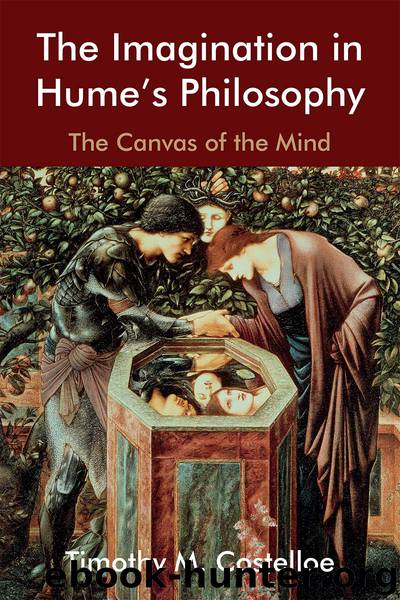The Imagination in Hume's Philosophy by Timothy M. Costelloe

Author:Timothy M. Costelloe
Language: eng
Format: epub
Publisher: Edinburgh University Press
5
History
In this chapter we focus our attention on the role of the imagination in Hume’s approach to history. Hume is rare among philosophers for being also a practising historian, and in his own lifetime and for a century thereafter he was better known for his seven-volume History of England than for the Treatise, Enquiries and Essays, for which he is now principally famous. As David Fate Norton and Richard Popkin document, the History had a long and illustrious career: it remained in print until the last decade of the nineteenth century, going through six editions while Hume was alive and (on their estimate, writing in 1965) ‘about 175’ posthumously. It remained the standard work on the subject until eclipsed by Thomas Babington Macaulay’s History of England (1848), a work considerably narrower in historical scope.1 As an active philosopher and practising historian, it is not surprising that Hume was sensitive both to matters of historiography – the methodological issues pertaining to the practice of isolating sources, selecting evidence and crafting a narrative – and to issues that fall (anachronistically) under ‘philosophy of history’, concerning historical understanding, historical knowledge and literary representation. The line between Hume’s historiographical and philosophical concerns is rarely, if ever, clearly demarcated, but the complex issues they raise come together in what he refers to as ‘philosophical history’.2
In order to appreciate what Hume means by this term, and to elucidate more generally how he understands the relationship between imagination, history and historical practice, I propose to frame the discussion in terms of aesthetics, extending some of the insights from the previous chapter. This approach might at first appear arbitrary or unwarranted, but we may put such worries to rest by noting how Hume himself provides impetus for pursuing this line of inquiry. In numerous remarks, he explicitly juxtaposes the craft of the historian against the art of the poet in order to highlight the strong connection of the former to the faculty of memory rather than imagination, emphasising how it is beholden to fact rather than fiction: unlike the poet who creates a poetic reality by subverting experience, the historian aims to depict it by reiterating the sequence of past events as accurately as possible, and when historians depart from matter of fact their narrative becomes false. At the same time, Hume emphasises how historians also rely on the imagination, for two reasons. First, the subject matter of history is available only indirectly, through the existence of written record, itself based largely on the testimony of others, which has to be made available through reconstructing the past; a historical depiction is thus a recreation, a tensed representation of experience, direct access to which is by definition impossible. Second, historians are obliged to represent historical events in a way that enlivens the imagination of the audience and procures a smooth and easy transition among the ideas they create in order to inspire true belief in the narrative they construct.
For these reasons, historians find themselves in a position that is both different from and compatible with that of the poet.
Download
This site does not store any files on its server. We only index and link to content provided by other sites. Please contact the content providers to delete copyright contents if any and email us, we'll remove relevant links or contents immediately.
The remains of the day by Kazuo Ishiguro(8965)
Tools of Titans by Timothy Ferriss(8360)
Giovanni's Room by James Baldwin(7315)
The Black Swan by Nassim Nicholas Taleb(7097)
Inner Engineering: A Yogi's Guide to Joy by Sadhguru(6783)
The Way of Zen by Alan W. Watts(6590)
Asking the Right Questions: A Guide to Critical Thinking by M. Neil Browne & Stuart M. Keeley(5751)
The Power of Now: A Guide to Spiritual Enlightenment by Eckhart Tolle(5742)
The Six Wives Of Henry VIII (WOMEN IN HISTORY) by Fraser Antonia(5493)
Astrophysics for People in a Hurry by Neil DeGrasse Tyson(5172)
Housekeeping by Marilynne Robinson(4433)
12 Rules for Life by Jordan B. Peterson(4298)
Double Down (Diary of a Wimpy Kid Book 11) by Jeff Kinney(4257)
The Ethical Slut by Janet W. Hardy(4236)
Skin in the Game by Nassim Nicholas Taleb(4232)
Ikigai by Héctor García & Francesc Miralles(4229)
The Art of Happiness by The Dalai Lama(4120)
Skin in the Game: Hidden Asymmetries in Daily Life by Nassim Nicholas Taleb(3986)
Walking by Henry David Thoreau(3949)
